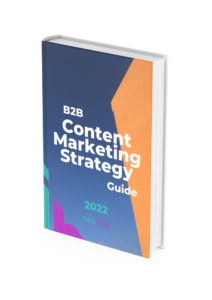Marketing strategy for consulting firms must have a long-term vision and should be about building the following three things:
- Visibility: You need to be an obvious choice for specific issues
- Authority: You should come across as an expert in your niche
Trust: You only get contacted if the potential client trusts you. You should appear credible and trustworthy.
Now, imagine:
- How would you show your expertise and display your competitive advantage?
- How would you encourage potential clients to choose you over others to solve their problems?
- What will you do to build your brand’s long-term visibility, trust, and loyalty?
Before we dive in, let's get started

Marketing your firm is not a straightforward task. It requires a lot of time and effort to get the best results. However, there are some things that you can do to make it easier for yourself.
The first thing you should do is create a marketing strategy for your consulting services. Your strategic marketing plan should include what kind of content you will use, how often you will post, who will post, and where you will post it. You should also have where you plan on getting your content from and how much time and money it will take to implement your strategy.
But, before you can begin working on a marketing plan for your consulting service you need to consider defining your Unique Selling Proposition (USP). Every company has one essential thing that makes them different from competitors. It is the part of your company’s marketing strategy that makes you different and unique from competitors.
Also, developing content for a specific USP is a great way to ensure you break through the clutter. You need to develop content that stands out.
Content is crucial for marketing for consulting firms
Content marketing in consulting services is about understanding your audience and establishing a bond with them by sharing valuable information.
What most people believe is that content marketing is about selling. It’s not. According to Content Marketing Institute, 87% of most successful B2B companies prioritize the audience’s informational needs over your organization’s sales and promotional message.
So why is Content King for consulting firms?

Content builds visibility and credibility
Building credibility in the B2B market is difficult for consultants who aren’t yet client favorites. But they can turn the tables by churning out insightful content. That is because content plays a critical role in establishing your image. Your credibility gets boosted if your content serves your client’s requirements well. Publishing quality in-house content regularly will build your visibility and credibility in your domain.
Great content establishes authority and trust
In the consulting and professional services industry, authority breeds trust. Clients tend to rely more on those who know their turf well. Design a B2B content marketing strategy to highlight your grip on the industry.
Identify, analyze, experiment – Every client and their needs are different. You may want to assess your client’s requirements and provide tailored solutions.
Build data-rich case studies, opinion pieces, posts, or whitepapers. Share industry-specific reports and surveys. Publish content with a primary aim to cement your relationship with your audience.
Reasons why consulting firms struggle with Content Marketing

Working in Silos
The biggest mistake a consulting firm makes when it comes to marketing – Is letting their marketing team work in a Silo.
The following is quite common across consulting firms.
- Consultants are time-pressed and thus avoid sanitizing project documents for internal use
- Knowledge managers responsible for sharing content and information internally do not work on client projects directly, thus, have limited understanding of project deliverables
- Subject matter experts and researchers are merely used as data-generating machines and are working separately in their silo
And finally, marketers have no understanding of work done on various projects or the content/deliverables produced
Consulting firms are making the big mistake of not utilizing great content produced internally every day.
In-house skill shortage
Many small consulting firms are short-staffed. They do not have an in-house team of writers to produce quality content or the budget to outsource.
The solution? Align with freelancers and contractors. Make use of the ever-growing gig economy. Establish your own ‘contingent workforce’ and fill the gap. The advantage of this arrangement is getting the content expertise at a much lower price.
Legacy systems and mindsets
The consulting business has been for years, and so have the partners leading their marketing departments.
The content marketing giant has just risen, and many find it hard to understand. Also, many get cold feet trying to tinker with their current marketing budgets and systems when results may take a few months to become apparent.
Consulting firms need a top-down approach to shift their mindsets to compete in the new era.
7 Steps to build a robust content marketing strategy
Content marketing helps in building long-term relationships. Developing a robust strategy might take some time initially, but the exponential value is worth the effort.

Discover your niche
Producing unique content requires high endurance. Whatever you talk about has already been talked about by someone else too. So, why should people read your content or engage with you? Why should they approach you or your consulting company with their problems?
Your specialization or expertise distinguishes you from your competitors. It will also help you build a loyal clientele. Your brand positioning and expertise in a topic, industry, or location should resonate with your target market. Do a competitor analysis to see where you stand. Narrow your focus to cut through your competition. Don’t be a jack of all trades, master of none.
For larger firms, it is harder to focus on a specific area, but this is a challenge they must face head-on. If your potential clients are in multiple industries, focus on your functional expertise or the value you bring them. Great content is created when you are laser-focused on a specific area.
Define your business goals
Define your business goals early on. For instance, a short-term goal can be building on your brand awareness and the number of website visitors. Long-term goals can be conversions or sales.
Remember to select SMART (specific, measurable, achievable, relevant, time-bound) goals; alongside each point, put a timeline. For instance, you can set a goal to:
- Increase YoY sales by 15%
- Gain 5% market share by year-end
- Increase Q2 profit by 10
Understand your audience

Clarity on who your target audience is, serves two critical purposes.
- It directs your content marketing to the right audience
- It saves time and maximizes your return on investment (ROI)
If you have not yet invested time in developing buyer personas, then take that leap.
Here are some tips on finding data to create a buyer persona.
- Interview your customers
- Get information from your client-facing consultants
Use online tools, such as Google Analytics, to uncover data about your target persona
Craft a winning value proposition
Remember, your potential clients are living, breathing individuals with specific tastes, preferences, and personalities. Even though they are linked to business entities, they operate from the core of their emotions. And wherever emotions are involved, vulnerability, trust, intention, and authenticity are at play.
Connect with the client on a personal level and turn the brand into a bond. Here is how.
- Think of the paint point or a challenge your content will solve
- Think of stories you will tell
- Humanize your brand. Everyone shares their success story. You might want to share how many times you tripped and got back on your feet
Decide ‘how’ and ‘what tone’ you should use in your messaging
For inspiration, these 10 B2B Content Marketing Case Studies
Be ready to share your opinions freely
Consultants get paid for their exceptional understanding of client issues and problem-solving skills. Therefore,
- Put your expertise at the forefront of your marketing strategy
- Be bold in sharing your opinions
- Don’t hide your analysis behind curtains
Your point of view will give you an edge over your competitors.
Assign a budget for your content marketing
As per the Content Marketing Institute, 26% of B2B firms spend 10-24% of their marketing budget on content marketing, whereas 17% spend up to 50%.
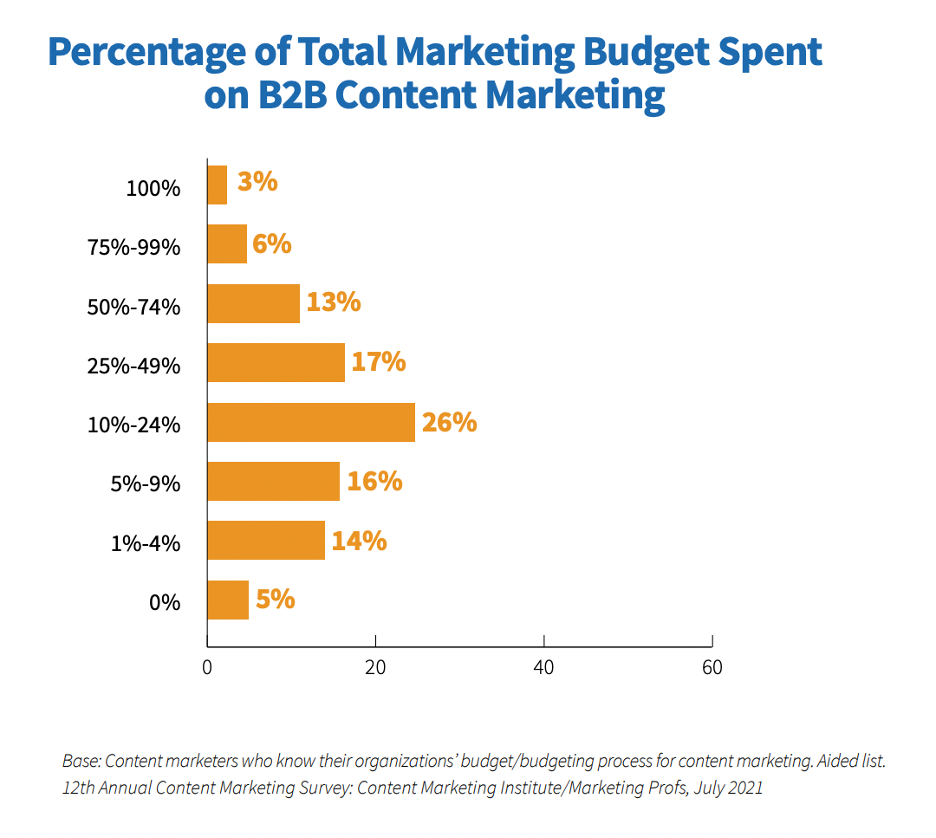
Your budget will depend on your unique situation, and large enterprises will be able to spend much more than small businesses. Your business goals must align with the budget and resources at your disposal.
Consider the following to assign a budget:
- Review benchmarks
- Consider your company size and industry
- Take stock of past projects’ effectiveness
- Estimate the necessary funds for new and existing projects
- Calculate the funds needed for tools and technology
- Plan for the resources required
- Estimate third-party vendors or contractors’ expenses
- Forecast content promotional costs, if any (Google search ads, LinkedIn ads, etc.)
For more, read – Developing a Marketing Budget Plan for Professional Services
Align content marketing KPIs with your organization’s strategic business goals

After a heavy drill of making your content appealing, and strategizing it for engagement, measure the impact of your drill. But you would never know if you were heading in the right direction without this exercise.
So, how do you select marketing objectives that align with your business goals?
- Involve your marketing team in the business planning process. Marketing is a crucial function of a business, and this team should not work in a vacuum
Get an outline of the business plan. Work backward to find marketing metrics to support your business goals.
Focus on metrics for each of the content marketing objectives – Reach, Engage, Convert, and Retain. Learn here about the stages of the buyer’s journey.
Create content consistently
Start by creating a high-level editorial calendar

An editorial calendar is a visual workflow. It helps you plan your progress, so you don’t fall short of expectations. A calendar is like a living document that will help you organize, divide and rank your content creation efforts. You can download free editorial templates from HubSpot’s resources link.
Core elements of a content calendar include:
- The topic of the content piece
- Date of release
- A content owner or author – who is responsible for content ideation, creation, and publishing
- Status – Pending, in-progress or completed
- Keywords Targeted
- Content distribution channels
How To Create an Effective Content Calendar in 2022? – Have a read!
Audit your content
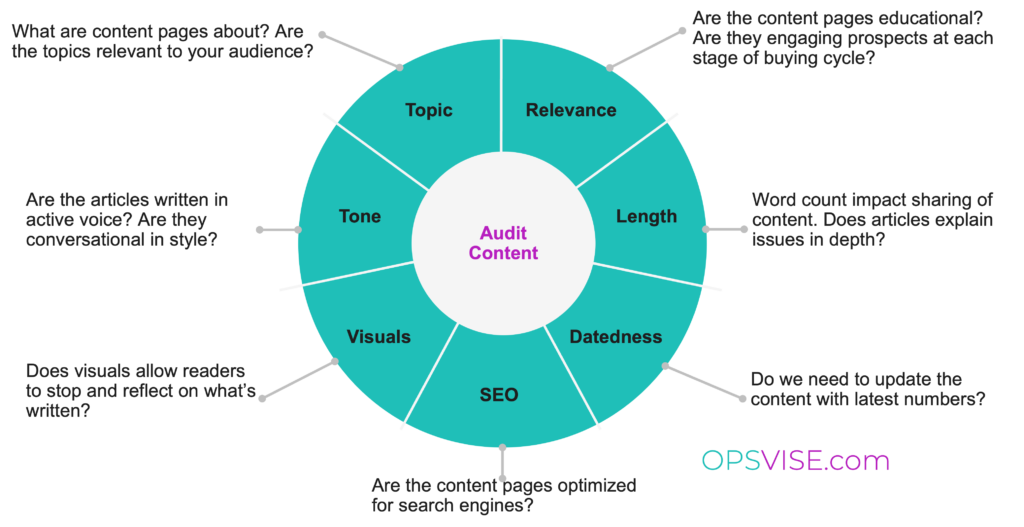
Stop. Breathe. Reflect. Reset. Nope! I am not talking yoga here. I am talking about how you can realign content on your website to make it more valuable for your potential clients. Take an inventory of content your potential clients consume at each stage of their journey. Look for ways you can optimize and upsell it. Take dedicated time to go through your website. Identify content that needs improvement. Reflect on how you can make it more exciting and, if required, give it a new swing or put it in a fresh format.
Focus on topic clusters and create pillar pages
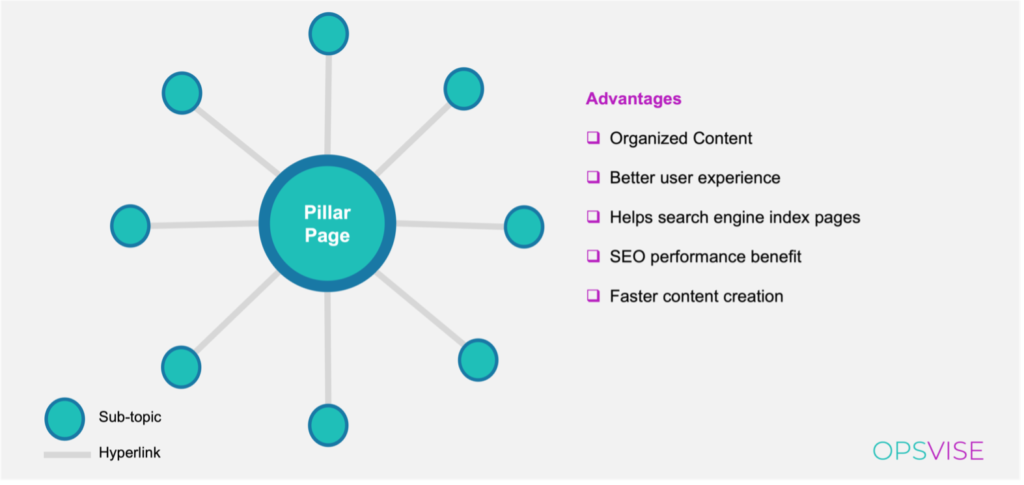
After working hard on bringing out stellar content, think of how to rank better. Page pillars and topic clusters help in that regard. A pillar page is a high-level content page that covers all aspects of a topic hyperlinked by in-depth blog posts. It helps increase search engine rankings. The only catch is that this strategy demands ample time and, if not executed, may also have a negative impact.
Repurpose your content
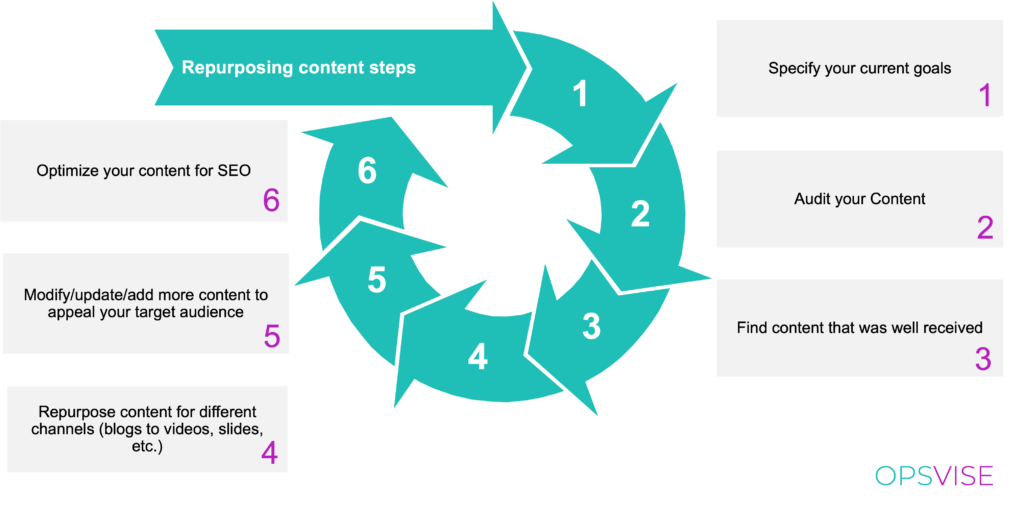
You don’t have to create new content day in and day out. Repurpose. Take dedicated time to identify content that needs refurbishing, reflect on how you can make it more interesting, give it a new perspective or put it in a fresh format and repurpose it according to changing client needs. You may feel that reinventing your wheel may be a useless exercise, but it’s not. Instead, it is one of the most efficient content marketing tactics to help you align with your current marketing goals.
Create a content ideas generation system

You are wrong if you think you can generate content ideas without a process! You need a system and an approach to develop valuable content ideas for your target audience. Now, I will share a way to quickly generate 100s of impactful ideas!
Go to answerthepublic.com. Enter a high-level topic that you want to write about in the search box—for example, B2B Content Marketing
Your search query will result in questions people are asking related to your topic/sector. For instance – “what is B2B content marketing?”
Copy these questions in excel and use tools like Google keyword planner, Semrush, and Moz to know the volumes of searches for these questions. Look at the difficulty of ranking for these keywords. Avoid those with high difficulty scores.
Now, shortlist keywords that have the right balance of volume and difficulty. Consider your expertise when shortlisting keywords/topics you will be writing on. Make sure you pick keywords to create engaging content for each stage of the consumer buying cycle – Reach, Engage, Convert, and Retain
You will have a list of broad questions you will be answering. Think of long-form content pieces, such as white papers, thought leadership articles, podcasts, opinion pieces, webinars, etc. Here are the B2B content assets that produced the best result in the last 12 months. Speaking engagements, such as virtual events and webinars, are among the most effective ways to showcase your authority.
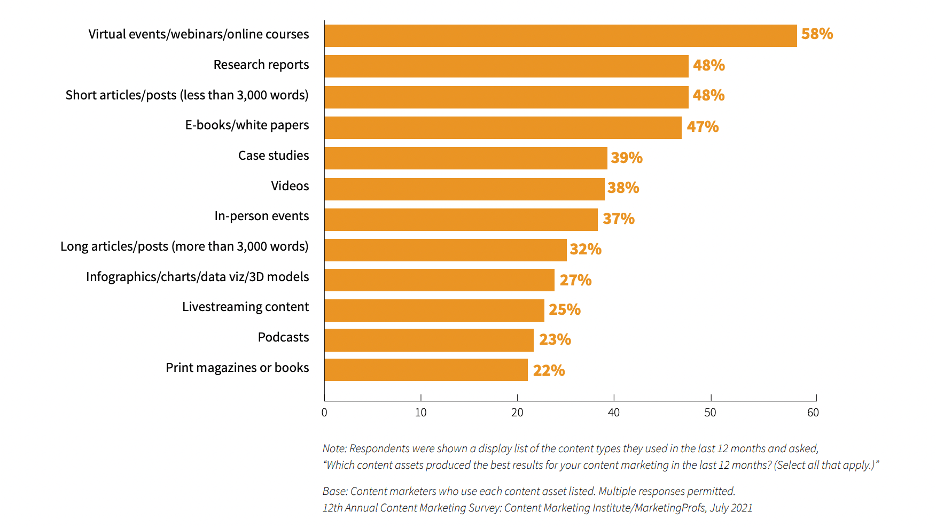
- Start small—one sub-topic at a time, with a quest to create valuable long-form content for your target market
Leverage internal expertise
Consultants excel in their functional expertise; many possess in-depth industry knowledge and constantly gain knowledge by solving specific challenges. Consultants also work closely with the clients and understand their pain points.
Use this knowledge to create thought leadership articles or opinion pieces. Create mediums for internal knowledge sharing and collaboration. Break Silos between internal departments and foster a culture of creativity. At first, it may take some time, but gradually, you will see yourself designing a winning content marketing strategy for your consulting firm.
Most popular content types for consulting business
Webinars/Virtual Events
Speaking engagements are great promotional events. They help convincing potential clients that you have a strong hold on your niche. They drive in high traffic because of their in-person feel. Your audience can see you and connect with you better. The more popular you are in the speaking circuit and networking events, the more your connections increases and fuels your demand generation efforts.
Whitepapers
A white paper is an in-depth article that intends to provide a solution to a complex problem. Whitepapers do wonders showcasing your expertise and authority in your niche. They are informative and persuasive documents to influence decision-making. If you want to know how to write a whitepaper that wins consulting projects – learn from Gordon Graham.
Thought Leadership Articles
Thought leadership articles are usually long-form content focusing on the author’s opinion or expertise on a given topic. They also help in positioning the company in its niche. The most important thing when writing such articles is to make sure that they are not only informative but also original, fact-based and engaging. This will help you build credibility and trust with your readers.
Podcasts

Podcasts are content goldmines that drive high engagement and loyal listenership. They are also a good way to reach out to your target audience and connect with them on an emotional level. Podcasts have been around since the early 2000s, but they have really taken off in popularity in recent years. The number of podcasts available has increased dramatically, and so has the number of listeners.
Many marketers have started using podcasts in their campaigns because of their effectiveness in generating leads. And you can repurpose them into other formats, such as blogs or videos. The Deloitte Global Insights podcast series is an excellent example for consulting firms.
Use social media to reach your audience

Social media marketing is one of the most important tools for B2B businesses. It can help you build a brand, reach out to prospects, and drive leads.
Here are some social media marketing tips for consulting firms:
- Use LinkedIn to find your prospects and engage with them
- Create and promote content that solves problems or provides valuable insights
- Build a strong online presence
Do you know 800 million people around the world use LinkedIn? It has become the go-to social media platform for B2B businesses. Businesses use LinkedIn to promote their company, engage with potential clients, generate leads, hire new employees, and more.
Conclusion
Remember, content marketing strategies for consulting firms can be instrumental in building new relationships and cementing existing ones. Here is a quick refresher of the points we discussed.
- Build credibility by producing valuable and relevant content for your potential clients.
- Focus on establishing a bond with your audience.
- Discover your niche. Focusing on a particular field will make you a thought leader.
- Getting more clients is an inevitable part of your job. Clarity on who your target audience is and who your referral partners are is crucial.
- Speaking engagements/virtual events/webinars are among the most effective ways to reach your niche.
- If you want to prove your authority and expertise – do it through thought leadership content.
- Focus on having a point of view. It will give you an edge over your competitors.
Use LinkedIn in your marketing mix. Its a great medium for consulting and professional services firms to reach its audience.
Want to develop a robust content marketing strategy? Download our guide for free.
